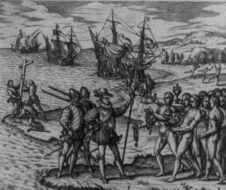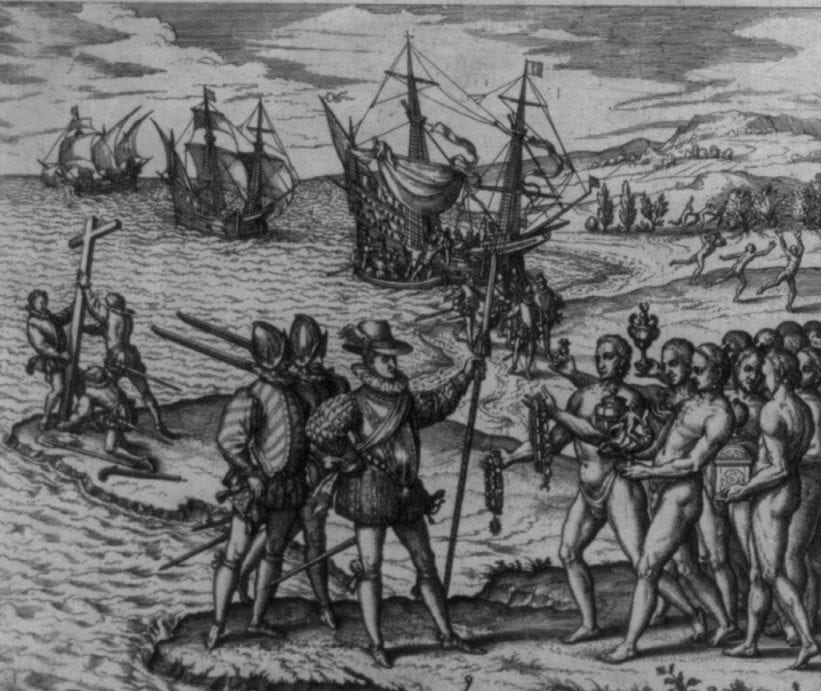

Conversation-based seminars for collegial PD, one-day and multi-day seminars, graduate credit seminars (MA degree), online and in-person.

No study questions
No related resources
How to treat the indigenous people became an issue as soon as the Spanish arrived in the Western Hemisphere. In a letter written soon after his first voyage, Christopher Columbus explained how he dealt with the natives and revealed his and Spain’s religious motive for exploring what he conceived to be, in explicitly religious terms (see Christopher Columbus to Doña Juana de Torres, 1500) a New World. In addition to the converts to Catholicism that Columbus mentions, the Spanish sought gold. What means were allowable in pursuit of these ends? By what authority did the Spanish make claims on the native people and their land? The Requerimiento provided the official answer to these questions.
Whatever Spanish justifications, the Spanish conquistadores or conquerors proved brutal and rapacious as the conquest continued. The authorities in Madrid did not approve. For example, laws regulating conduct in the conquest were promulgated in 1513 and 1542 (the latter partially repealed in 1545 because of opposition). They relieved Christopher Columbus of command over land he had discovered in part because of his brutality toward both Spanish settlers and the indigenous people. Columbus complained of the injustice of his removal (see Christopher Columbus to Doña Juana de Torres, 1500), by emphasizing that the New World was not like Spain but was an uncivilized lawless territory. Francisco de Vitoria, on the contrary, (see De Indis) sought to mitigate the harshness of the conquest by arguing that law – civil, natural and divine – should prevail everywhere. He argued for limits on what could legitimately be done to the indigenous people. In doing so, he helped develop just war theory. Despite de Vitoria’s arguments, distance from Madrid, limited means of communication, and the need for colonial wealth reduced the ability and willingness of Spain’s monarchs to control what was done in their name thousands of miles away from their palaces. Bartolomé de las Casas (A Short Description of the Destruction of the Indies, 1542) describes the consequences of the Spanish conquest.
Most Virtuous Lady:
Though my complaint of the world is new, its habit of ill-using is very ancient. I have had a thousand struggles with it, and have thus far withstood them all, but now neither arms nor counsels avail me and it cruelly keeps me under water. Hope in the creator of all men sustains me; His help was always very ready; on another occasion, and not long ago, when I was still more overwhelmed, He raised me with his right arm, saying, O Man of little faith, arise, it is I; be not afraid.1
I came with so much cordial affection to serve these princes, and have served them with such service, as has never been heard of or seen.
Of the new heaven and earth which our Lord made, when Saint John was writing Apocalypse,2 after what was spoken by the mouth of Isaiah,3 he made me the messenger, and showed me where it lay. In all men there was disbelief, but to the Queen my Lady He gave the spirit of understanding, and great courage, and made her heiress of all, as a dear and much loved daughter. I went to take possession of all this in her royal name. They sought to make amends to her for the ignorance they had all shown by passing over their little knowledge, and talking of obstacles and expenses. Her Highness, on the other hand, approved of it, and supported as far as she was able. . . .
They judge me over there as they would a Governor who had gone to Sicily, or to a city or town placed under regular government, and where the laws can be observed in their entirety without fear of ruining everything; and I am greatly injured thereby. I ought to be judged as a Captain who went from Spain to the Indes to conquer a numerous and warlike people, whose customs and religion are very contrary to ours; who live in rocks and mountains, without fixed settlements, and not like ourselves; and where, by the divine will, I have placed under the dominion of the King and Queen, our sovereigns, another world, through which Spain, which was reckoned a poor country, has become the richest. I ought to be judged as a Captain who for such a long time up to this day has borne arms without laying them aside for an hour, and by gentlemen adventurers and by customs and not by letters, unless they were Greeks or Romans, or others of modern times of whom there are so many and such noble examples in Spain; or otherwise I receive great injury, because in the Indes there is neither town nor settlement. . . .

Conversation-based seminars for collegial PD, one-day and multi-day seminars, graduate credit seminars (MA degree), online and in-person.
